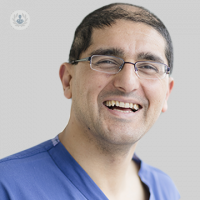Bronchoscopy: what is its purpose?
Autore:Leading expert in respiratory medicine and critical care Dr Sundeep Kaul explains bronchoscopy, including what it is used to diagnose and what happens during the procedure.
What is a bronchoscopy used to diagnose?
A bronchoscopy is used to diagnose a number of conditions such as lung cancer, infections (fungal or viral) and inhaled foreign bodies.

It can also be used to diagnose sources of bleeding, such as when someone is coughing stuff up and inflammatory conditions which are not cancer but still require specific treatment strategies. An example of one of these conditions would be sarcoidosis.
During a bronchoscopy, the specialist will look into your lungs and the air passages using a thin tube camera, which can be passed through the nose or mouth, past your throat, through the vocal cords and into your lungs. It is usually performed using a flexible camera scope. In the case of someone bleeding, we can use a rigid scope.
The common reasons for needing a bronchoscopy include the following:
- A persistent cough
- Infection
- Cancer
- Bleeding
- Recurrent chest infections.
- Something abnormal highlighted on a chest x-ray or a CT scan.
Will I be put to sleep for my bronchoscopy?
Yes, the majority of patients will be put under sedation for the procedure. However, you will not be fully unconscious, you are still usually breathing on your own, and you have enough consciousness and awareness to understand what the doctor is saying, but you will not be able to form a memory of it.
How long does a bronchoscopy take?
The length of the procedure will vary, depending on the reasoning for the bronchoscopy. The majority of bronchoscopies will last between 15 and 45 minutes. On average, it will take about 20 to 30 minutes.
Some can take longer if samples need to be taken for a biopsy, but generally, it will take between 15 and 30 minutes.
Is bronchoscopy a serious procedure?
Yes, I would consider any procedure that involves your airways and your lungs as being serious. However, it is done commonly and performed by doctors and surgeons who specialise in these disorders; it's a frequent procedure done every day or every week in the UK.
Although it is serious, the risk is low in terms of side effects or adverse effects because the surgeons performing the procedure are highly experienced and skilled.
Are there any disadvantages of a bronchoscopy?
Every procedure has risks and benefits which must be taken into consideration and weighed up before you undertake any procedure.
Some well-recognised risks associated with bronchoscopy include bleeding and infection. You may also have a hoarse voice following the procedure..
If you are taking a biopsy alongside a bronchoscopy, there is also the added risk of a collapsed lung. However, it is important to emphasise that these risks are very low, and the incidence of these well-recognised side effects are also low.
How useful is a bronchoscopy?
Bronchoscopy is extremely helpful for looking in the airways, especially the large airways, because it allows you to see the air passages. With regards to finding a source of bleeding, for taking a sample where there's a cancer that you can see, this is a helpful tool and part of the assessment process in patients with those conditions.
Unfortunately, it does not work well for conditions that are on the outside of the lung.
If you would like to book a consultation with Mr Kaul, simply visit his Top Doctors profile today.


